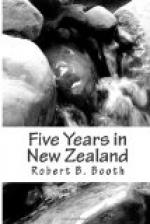Mr. Lee had three shepherds at this time in charge of flocks, who resided in different places at least four miles from each other and from the home station. Two of these were the sons of gentlemen in the Old Country, and one of them a distant relation. The life of the boundary shepherd is a peculiarly lonely one, especially if he be young and single. His residence is a little one-roomed hut, sometimes two rooms, built of mud and thatched with grass, an earthen floor, with a large chimney and fireplace occupying one end. His furniture consists of a table, bunk, and a couple of chairs, and if he be an educated man and fond of reading he will have a table for his books and writing materials. He is supplied monthly with a sack of flour and a bag of tea and sugar, salt, etc. His cooking utensils are a kettle, camp oven, and frying pan, to which are added a few plates, knives and forks, and two or three tin porringers. He always possesses at least one dog and a horse, and possibly a cat. The only light is that procured from what is called a slush lamp, made by keeping an old bowl or pannikin replenished by refuse fat or dripping in which is inserted a thick cotton wick. He cooks for himself, washes his own clothes, cuts up his firewood, and fetches water for daily use. Such luxuries as eggs, butter, or milk are unknown. Perhaps once a month he may have occasion to visit the home station, or somebody passing may call at his hut, or he may occasionally meet a neighbouring shepherd on his round. With these exceptions he has no intercourse with his fellow-beings, and all his affection is bestowed on his dog and horse; he would be badly off, indeed, without them.
One of these young men, by name Wren, became a great friend of mine, and many a time I visited him or spent a night in his lonely little hut, which was located in a small clearing surrounded by dense bush and immediately over a small and turbulent stream, which he used to say was always good company and prevented his feeling so lonely during the long dark nights as he otherwise would. It is strange how in the course of time a person will get accustomed to such a lonely life, and many like it, but it cannot be good for a young man to have too much of it, and fortunately for Wren a few years would see him located at headquarters. To take charge of a boundary was part of his education as a cadet.
It was different with the other. He was an unfortunate of that class so frequently met with in the Colonies, a “ne’er-do-well” who had while at home contracted habits of dissipation, and he was sent out to New Zealand under the then very mistaken supposition that he would thereby be cured. But there is no permanent cure for such a man; his life may be prolonged a little by enforced abstinence, but he will never, or rarely ever, recover his power of will so far as to avoid temptation if it comes in his way. If it be possible to do such a man any real good, there may be some chance for him at home, where he




